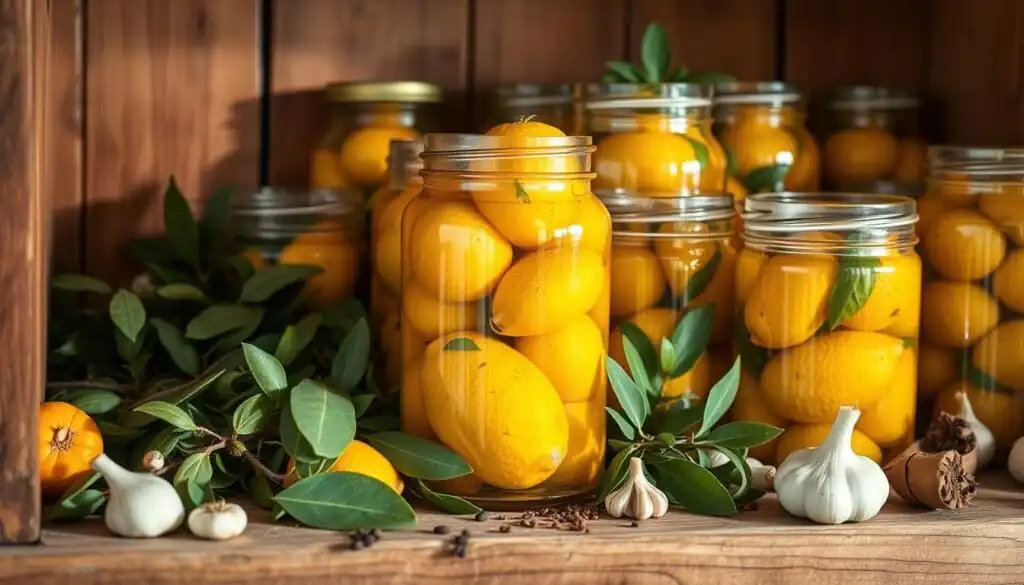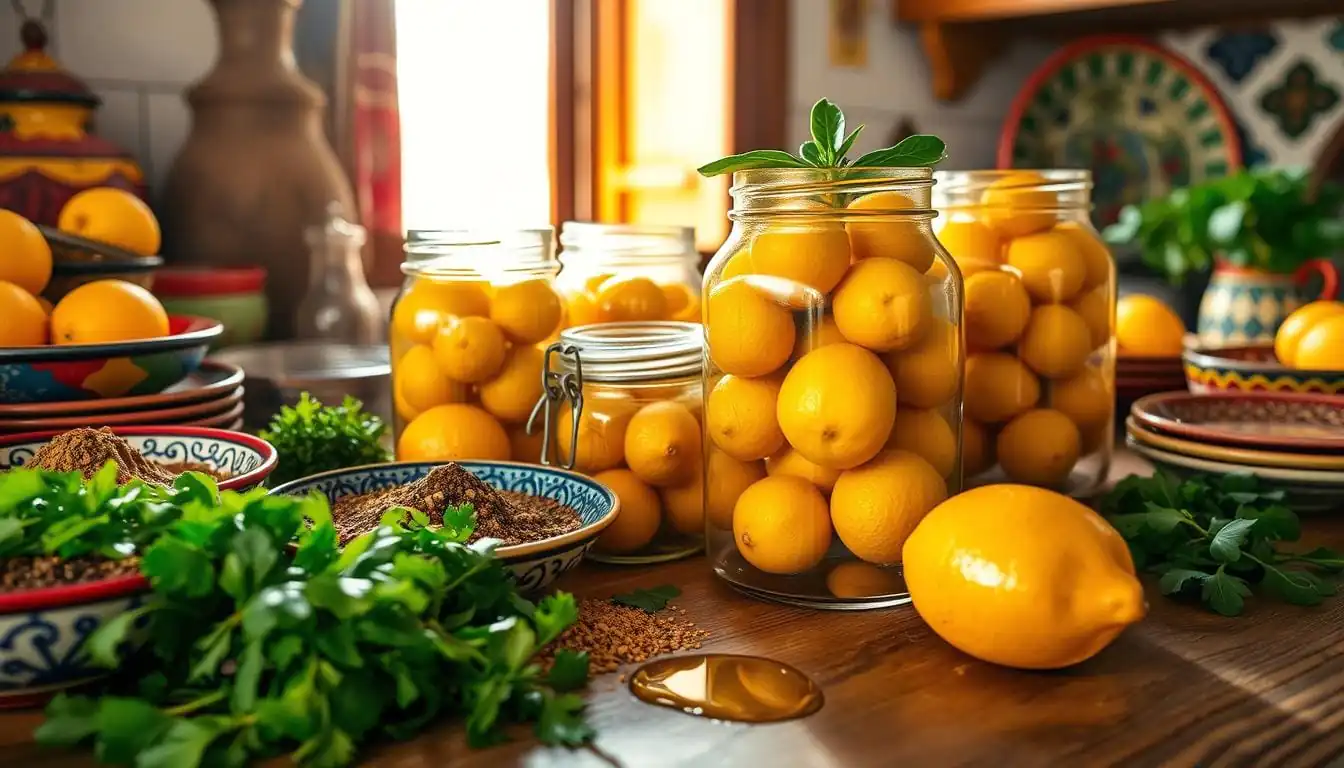Preserved Moroccan Lemon: A Flavorful Delight
Table of Contents
Imagine adding a burst of citrus flavor to your favorite dishes with a unique ingredient. Preserved Moroccan lemon has been a staple in Moroccan cuisine for centuries. It’s made by preserving lemons in a salt and water mixture.
This authentic Moroccan preserved lemon is a game-changer for any recipe. Its rich history dates back to the 12th century.
Exploring Moroccan preserved lemon reveals its health benefits and versatility. It’s great in tagines and salads. With its growing popularity, finding preserved Moroccan lemons in grocery chains is easy.
This makes it simple to add this flavorful ingredient to your cooking. Enjoy the authentic Moroccan preserved lemon experience.
Understanding Preserved Moroccan Lemon
Preserved Moroccan lemons, also known as moroccan lemon preserve, have a rich history and cultural significance in Morocco. To make the best preserved moroccan lemon, you need to understand the traditional origins and basic components involved in the preservation process. The traditional Moroccan preservation technique for lemons involves salt-packing fresh lemons in their own juice, which is a crucial step in how to make preserved moroccan lemon.
The process of preserving lemons is quite simple, requiring just a few basic components, including lemons, salt, and water. The type of lemons used can vary, but Eureka and Meyer lemons are popular choices. The resulting moroccan lemon preserve can be used in a variety of dishes, adding a complex, salty, and savory flavor profile.
- Complex, salty, and savory flavor profile
- Typically made from Eureka or Meyer lemons
- Can be used in a variety of dishes, such as tagines, stews, and salads
By understanding the traditional origins and basic components of preserved Moroccan lemons, you can learn how to make preserved moroccan lemon and enjoy the unique flavor and cultural significance of this moroccan lemon preserve.
| Lemon Variety | Preservation Method | Flavor Profile |
|---|---|---|
| Eureka | Salt-packing | Complex, salty, and savory |
| Meyer | Salt-packing | Slightly sweeter, complex, and savory |
The Rich History Behind This Mediterranean Staple
Preserved lemons have been around for over eight centuries, starting in Morocco. The way they’re made makes them taste bolder and brighter than fresh lemons. This flavor is why they’re a big deal in Mediterranean cooking, like in Moroccan dishes.
They’re also packed with good stuff like vitamin C, potassium, and fiber. These nutrients help your immune system, blood pressure, and heart health. Making preserved lemons is easy, needing just lemons, salt, and water. This makes it simple for people to make them at home.
The moroccan preserved lemon benefits include making food taste better and lasting a long time. They can stay good for years in the pantry or fridge. If you want to spice up your cooking or try something new, preserved lemons are a great choice.
- Add them to tagines and stews for a burst of citrus flavor
- Use them in salad dressings and marinades for a unique twist
- Chop them up and add them to soups and sauces for extra flavor
Preserved lemons have a rich history, a unique taste, and health perks. They’re a fantastic addition to any kitchen. Whether you’re an experienced cook or new to Mediterranean food, preserved lemons are worth a try.
Essential Ingredients for Authentic Moroccan Preserved Lemons
To make authentic Moroccan preserved lemons, you need a few key ingredients. The right lemons, like Meyer or doqq lemons, are crucial for the best taste. You can find these lemons at most grocery stores or where to buy preserved moroccan lemon online.
Coarse, unrefined salt, such as sea salt or kosher salt, is also necessary. Optional spices like cinnamon, cloves, and bay leaves can add depth to the preserved moroccan lemon.
Here are some key ingredients to get you started:
- 7-10 fresh lemons
- 1/4-1/2 cup of kosher salt or sea salt
- 2 bay leaves
- 1/2 teaspoon of black peppercorns
- Optional: cinnamon sticks, coriander seeds, or star anise
With these ingredients, you can make delicious and authentic Moroccan preserved lemons. They will add a burst of flavor to any dish. Whether you’re making a traditional tagine or adding a twist to a modern recipe, preserved moroccan lemon is a versatile ingredient that’s sure to impress.
| Ingredient | Quantity |
|---|---|
| Lemons | 7-10 |
| Kosher salt or sea salt | 1/4-1/2 cup |
| Bay leaves | 2 |
| Black peppercorns | 1/2 teaspoon |
Step-by-Step Guide to Making Preserved Moroccan Lemon
To make preserved Moroccan lemons, you need a few simple things. You’ll need lemons, salt, and water. The process is easy: ferment the lemons in a jar with salt and water for weeks. Here’s how to do it for a preserved lemon recipe:
First, get your ingredients ready. You’ll need 10-12 large lemons, sea salt or kosher salt, and water. Also, grab a glass canning jar and a sterilized lid.
Then, cut the lemons into quarters and remove seeds or pulp. Pack the lemons into the jar, covering them with salt and water. Place the jar in a cool, dark spot for at least a month. Shake the jar every few days. This is the basic how to make preserved moroccan lemon guide.
Once the fermentation is done, store the lemons in the fridge. They’ll last up to a year there. Use them in tagines, stews, and salads. With these steps, you can make your own preserved lemon recipe and enjoy the unique flavor of preserved Moroccan lemons.
The Art of Proper Fermentation and Curing
Making a preserved Moroccan lemon involves fermentation and curing. These steps are key to getting the right flavor and texture. You need to watch the temperature, timeline, and signs of success.
Fermentation can take weeks to months. Be patient. Keep the lemons cool, like in a pantry or cupboard. This slows down fermentation and enhances flavor and texture.
Temperature Considerations
The best temperature for fermentation is 64°F to 75°F (18°C to 24°C). This range helps good bacteria grow and keeps bad ones away.
Timeline and Phases
Fermentation has several phases: initial fermentation, curing, and storage. The first phase, lasting weeks, is when the lemons start to flavor up.
Signs of Successful Preservation
Check your preserved Moroccan lemon after weeks or months. Look for a tangy flavor and firm texture. Also, watch out for mold or spoilage.
By following these tips, you can make your own preserved Moroccan lemon. It’s great in tagines or modern dishes.
| Phase | Duration | Characteristics |
|---|---|---|
| Initial Fermentation | 2-4 weeks | Lemons start to develop flavor and texture |
| Curing | 2-6 weeks | Lemons become more sour and crunchy |
| Storage | Up to 6 months | Lemons can be stored in the refrigerator |
Creative Ways to Use Preserved Lemons in Cooking
Preserved lemons are a versatile ingredient that can add a burst of citrus flavor to various dishes. They are great for making stews, tagines, and salads taste better. You can use them in a preserved lemon recipe for a traditional Moroccan dish or try new flavors and ingredients.
Some creative ways to use preserved lemons include:
- Adding them to soups and stews for a tangy, sour taste
- Using them as a topping for salads, such as a simple green salad or a more complex grain salad
- Incorporating them into sauces and marinades for meats, vegetables, or legumes
When using preserved lemons in your cooking, remember that a little goes a long way. Start with a small amount and taste as you go, adjusting the seasoning to your liking. With their unique flavor and numerous health benefits, preserved lemons are a great addition to any kitchen.
By incorporating preserved lemons into your cooking, you can experience the moroccan preserved lemon benefits for yourself and discover new flavors and recipes to enjoy.
| Dish | Ingredients | Instructions |
|---|---|---|
| Preserved Lemon Salad | Preserved lemons, mixed greens, cherry tomatoes, red onion, feta cheese | Combine all ingredients in a bowl and toss with a simple vinaigrette |
| Preserved Lemon Chicken | Preserved lemons, chicken breast, olive oil, garlic, herbs | Marinate chicken in a mixture of preserved lemon, olive oil, garlic, and herbs, then grill or bake until cooked through |
Health Benefits and Nutritional Value
Adding preserved moroccan lemon to your meals can bring many health perks. It’s packed with vitamin C, which boosts your immune system. It also has fiber, potassium, and antioxidants, making it a healthy choice for your meals.
Preserved lemons also support your digestive health. They have probiotics that help keep your gut healthy. Plus, with just 5 calories per serving, they add flavor without adding calories.
Digestive Benefits
Preserved lemons are full of nutrients that help with digestion. The fiber in them can prevent constipation. The probiotics also help keep your gut microbiome balanced.
Vitamin Content
Preserved lemons are a great source of vitamin C. One serving gives you a big chunk of your daily vitamin C needs. Vitamin C is key for a strong immune system, healthy skin, and iron absorption.
Some of the key nutritional benefits of preserved lemons include:
- Low calorie count: 5 calories per serving
- No total fat or sugars
- High in vitamin C and fiber
- Rich in antioxidants and probiotics
Probiotic Properties
The probiotics in preserved lemons support gut health. They boost your immune system and help keep your digestive system balanced. With their health benefits and nutritional value, preserved moroccan lemons are a smart choice for a healthy diet.
Storage Tips and Shelf Life
Storing preserved Moroccan lemons right is key to keeping them fresh and tasty. Store them in a cool, dark spot like a pantry or cupboard for up to a month. Then, move them to the fridge to keep them longer.
Refrigeration makes preserved lemons last longer. Opened jars can stay good for 6 months in the fridge. If stored right, they can last 6-12 months. You can even freeze them for up to 6 months. To make and store them well, use a good preserved lemon recipe.
Here are some storage tips to remember:
- Keep preserved lemons away from light and heat to prevent spoilage.
- Check for signs of spoilage, such as off-odors, mold growth, or changes in texture, and discard the entire batch if necessary.
- Store preserved lemons in airtight containers to maintain their flavor and texture.

By following these tips and using a trusted preserved lemon recipe, you can enjoy your preserved Moroccan lemons for a longer time. You’ll also learn how to use them in your cooking.
Common Mistakes to Avoid
Working with preserved Moroccan lemon requires knowing common mistakes. These can impact your dish’s quality and taste. Understanding how to handle and use it is key.
Common errors include processing errors. These include using the wrong lemons or salt, or not fermenting long enough. This can make your preserved lemon taste and feel off.
Processing Errors
To avoid these, pick the right lemons and salt. Follow a reliable recipe. This ensures your lemons ferment correctly.
Storage Mistakes
Storing your preserved lemon wrong is another mistake. Don’t keep it in warm or light places. Keep it cool and dark to preserve its flavor.
Usage Missteps
Be careful with how much you use. Start with a little and adjust to taste. Try different recipes to find the best use for your lemon.
By avoiding these mistakes, you can fully enjoy your preserved Moroccan lemon. It’s great in traditional dishes or new recipes. This ingredient adds a unique flavor to your cooking.
Where to Buy Authentic Preserved Moroccan Lemons
Looking for where to buy preserved moroccan lemon? You have a few choices. You can check out specialty stores like Middle Eastern or African markets. Or, you can shop online at places like Amazon. Brands like Mina offer preserved moroccan lemon products that are top-notch and free from additives.
Here are some great places to find preserved moroccan lemon products:
- Online retailers: Amazon, Walmart, and other online stores carry a wide selection of preserved moroccan lemon products.
- Specialty stores: Middle Eastern or African markets often carry a variety of preserved moroccan lemon products.
- Grocery chains: Some grocery chains, such as Whole Foods, Wegmans, and Kroger, carry preserved moroccan lemon products.
When you’re shopping for preserved moroccan lemon products, make sure to check the ingredients. Look for products that use high-quality lemons and are free from additives. With a bit of research, you’ll find the perfect preserved moroccan lemon product for your dishes.
| Brand | Price | Availability |
|---|---|---|
| Mina | $12 | Online, Whole Foods, Wegmans, Kroger |
Pairing Suggestions and Recipe Ideas
Preserved lemons open up a world of flavors in your cooking. You can squeeze the juice for a burst of citrus or use the lemon itself for extra taste. They’re a key ingredient in Moroccan dishes like chicken and olive tagine. The preserved lemon recipe brings a unique citrus flavor to these dishes.
But preserved lemons aren’t just for traditional dishes. They can also spice up modern recipes. Try them in sauces, marinades, or as a topping for salads and soups. The moroccan preserved lemon benefits are many, making any dish more exciting. For instance, a preserved lemon and herb salad is a tasty and healthy option.
Quick Recipe Ideas
- Add preserved lemons to soups and stews for a burst of citrus flavor
- Use preserved lemons as a topping for salads and soups
- Make a preserved lemon paste by blending whole preserved lemons in a food processor
Preserved lemons are incredibly versatile. Their unique taste and health perks make them a favorite in many kitchens. Whether you’re cooking a classic Moroccan dish or something new, preserved lemons add a special touch. Experiment with different preserved lemon recipe ideas and enjoy the moroccan preserved lemon benefits for yourself.
Conclusion
Preserved Moroccan lemons are a fascinating ingredient. They bring the lively spirit of Moroccan cuisine to your kitchen. These lemons add a burst of citrus flavor and showcase Morocco’s rich culture.
Adding Moroccan preserved lemons to your recipes opens up new possibilities. They enhance the taste and smell of dishes, from traditional tagines to modern recipes. They make your meals more exciting, inviting you to explore Moroccan flavors.
Whether you make your own or buy them, preserved lemons are a game-changer. They add a unique taste to your cooking. Start your Moroccan culinary journey with these lemons and enjoy the flavors they bring.
FAQ
What are preserved Moroccan lemons?
Preserved Moroccan lemons are a tasty ingredient. They are made by soaking lemons in salt and water. This gives them a special flavor and texture.
What is the history and cultural significance of preserved Moroccan lemons?
Preserved Moroccan lemons have a long history, dating back to the 12th century. They were used to keep lemons fresh for a long time. In Morocco, they are a key ingredient and hold great cultural value.
What are the essential ingredients for making authentic preserved Moroccan lemons?
To make real preserved Moroccan lemons, you need thin-skinned lemons like Meyer or doqq. You also need coarse, unrefined salt. Optional spices like cinnamon, cloves, and bay leaves can add extra flavor.
How do you make preserved Moroccan lemons?
First, cut the lemons into quarters and remove seeds or pulp. Then, pack them into a jar with salt and water. Let them ferment for weeks.
What are the temperature considerations and fermentation timeline for making preserved Moroccan lemons?
Keep the lemons cool, like in a pantry. Fermentation can take weeks to months. It’s important to cure them right to get the right flavor and texture.
How can you use preserved Moroccan lemons in cooking?
Use them in Moroccan dishes like tagines and stews. They’re also great in salads, sauces, and marinades. They add a tangy citrus flavor.
What are the health benefits and nutritional value of preserved Moroccan lemons?
They’re packed with vitamin C and fiber. They also have potassium and antioxidants. Plus, they’re good for your gut and immune system.
How should preserved Moroccan lemons be stored?
Store them in a cool, dark place like a pantry. They can also be kept in the fridge for years.
What are some common mistakes to avoid when making and using preserved Moroccan lemons?
Avoid using the wrong lemons or salt. Don’t ferment them too short. Store them in a cool place, not warm or light. Use them right in your dishes.
Where can you buy authentic preserved Moroccan lemons?
Find them at specialty stores like Middle Eastern or African markets. You can also buy them online at places like Amazon. Look for high-quality products without additives.

